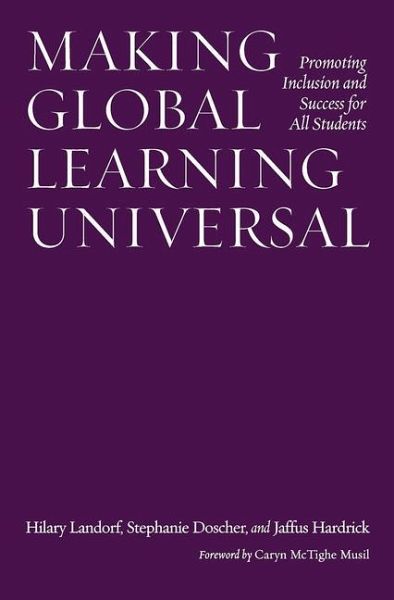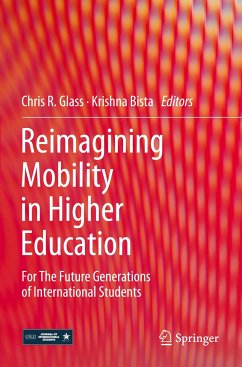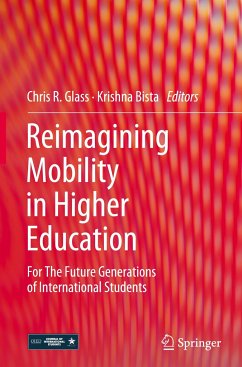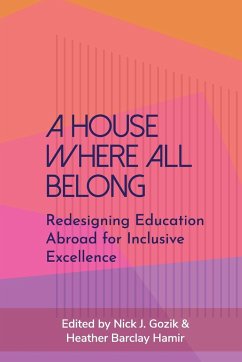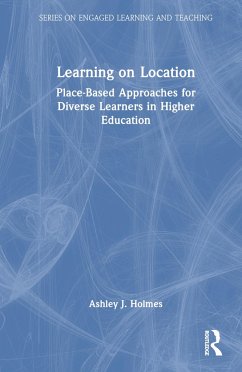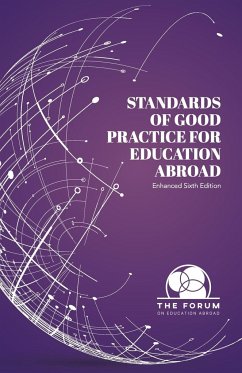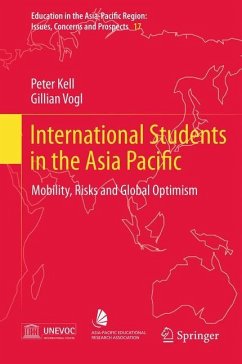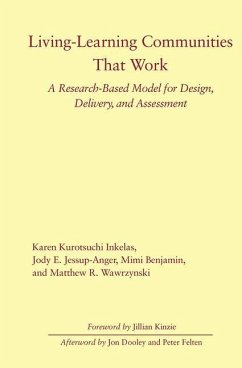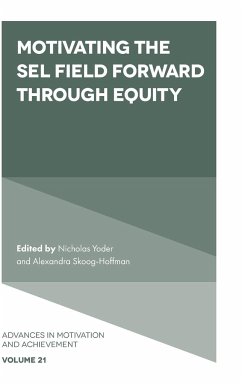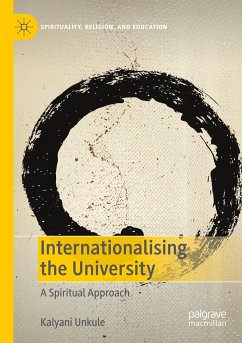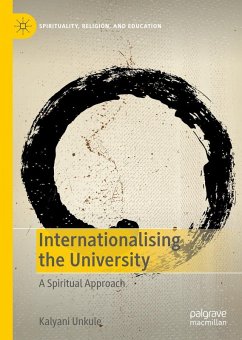Making Global Learning Universal
Promoting Inclusion and Success for All Students
Versandkostenfrei!
Versandfertig in 1-2 Wochen
Weitere Ausgaben:

PAYBACK Punkte
86 °P sammeln!





While there is wide consensus in higher education that global learning is essential for all students' success, there are few models of how to achieve this goal. The authors of this book provide such a model and, in doing so, offer readers a broad definition of global learning that both encompasses a wide variety of modes and experiences and engages all students on campus.
Hilary Landorf is Executive Director of the Office of Global Learning Initiatives at Florida International University (FIU). The Office oversees FIU's university-wide initiative, Global Learning for Global Citizenship, winner of the Institute of International Education's 2016 Heiskell Award for Internationalizing the Campus. Hilary also serves as Executive Director of the Comparative and International Education Society. She is an Associate Professor in FIU's School of Education and Human Development and leader of its Master of Science degree program in International and Intercultural Education. Hilary's expertise centers on visioning, developing, designing, and implementing the policies and practices of global learning efforts in higher education. She writes, consults, and presents internationally on integrating global learning in K-20 educational settings. Her recent publications include "Defining Global Learning at Florida International University" in AAC&U's Diversity and Democracy, co-authored with Stephanie Doscher; "Global Perspectives on Global Citizenship" in Contesting and Constructing International Perspectives in Global Education; and "Using Democratic Deliberation in an Internationalization Effort in Higher Education," in Disrupting Adult and Community Education: Teaching, Learning, and Working in the Periphery. Stephanie Doscher is Director of Florida International University's Office of Collaborative Online International Learning (FIU COIL). She also serves as Program Evaluator for the university's Title VI-funded Kimberly Green Latin American and Caribbean National Resource Center. Stephanie's work focuses primarily on organizational leadership and strategic planning, professional development, and integrative curricular and co-curricular design to enable global learning for all. Her research interests concern global learning instruction and assessment and the relationship between global learning, social innovation, and inclusive excellence. S
Produktdetails
- Verlag: Routledge
- Seitenzahl: 290
- Erscheinungstermin: 7. September 2018
- Englisch
- Abmessung: 235mm x 157mm x 20mm
- Gewicht: 574g
- ISBN-13: 9781620363591
- ISBN-10: 1620363593
- Artikelnr.: 47749416
Herstellerkennzeichnung
Libri GmbH
Europaallee 1
36244 Bad Hersfeld
gpsr@libri.de
"At a moment when terms like diverse, interconnected and global have become, in the authors' words, 'politically charged dynamite', this book argues persuasively that making global learning universal is essential to student success in an increasingly interconnected world. Organized thoughtfully in three sections that include cogent definitions, exemplary promising practices, and assessment and program evaluation, this publication is required reading for those committed to exploring global literacy in the primary, secondary, and tertiary educational sectors."
Gil Latz, Ph.D., Associate Vice Chancellor for International Affairs, Professor of Geography, and Affiliated Professor of Philanthropic Studies
Indiana
Gil Latz, Ph.D., Associate Vice Chancellor for International Affairs, Professor of Geography, and Affiliated Professor of Philanthropic Studies
Indiana
Mehr anzeigen
University-Purdue University Indianapolis
"From the pioneers of global learning, a much-welcomed guide to this new terrain, written for any postsecondary educator concerned with equity and quality. Landorf, Doscher, and Hardrick offer global learning as an inclusive, participatory process for every student. Unlike traditional international education, global learning dissolves the false binaries of U.S. and global, 'we' and 'other', study abroad and study at-home, so that students learn in and of the world, and not merely about it."
Heather H. Ward, Associate Dean for Study Abroad and International Exchanges
University of North Carolina, Chapel Hill
From the Foreword
"It's almost impossible to dislodge a strong, long-held belief, however much the facts contradict it. This has been the case with default thinking about how to instill college students with a global consciousness and a more expansive understanding of individuals' and nations' responsibilities within a global ecology. For decades, the autopilot response has been 'study abroad.' Making Global Learning Universal: Promoting Inclusion and Success for All Students disrupts those assumptions and offers an alternative that is now institutionalized at Florida International University. In FIU's educational design for universal global learning, students can achieve global learning without a passport. It's a blueprint that relies on moving minds, not bodies.
[This book] records a remarkable institutional venture, provides extraordinary vision, and bolsters the reluctant to not hold back. The authors offer contemporary theories that undergird this new conception of global learning, the engagement with diversity as foundational, the nuts and bolts of how they proceeded and where they stumbled, the strategies that involved 1200 faculty in 97 different professional development opportunities, and the leadership and infrastructure that have been critical to sustaining momentum. This book has redrawn the map for global learning. The authors not only recognize that the world is not flat, but they reveal that it can be seen, understood, experienced, and engaged with right here on American soil."
Caryn McTighe Musil, Senior Scholar and Director of Civic Learning and Democracy Initiatives
AAC&U
"Making Global Learning Universal, a case study of education reform, focuses on the process of integrating global learning into the curriculum and co-curriculum. It's primarily about undergraduates and student learning...[an] ambitious book, drawing larger lessons for (and about) higher education from a relatively limited empirical base. As participants in the international education community, where there is now great interest in the concept of global citizenship, the authors have designed this book to present FIU's model in a way that can 'make it replicable through customization'-so the reader can 'translate, not transfer' the initiative to his or her own 'unique context'.
Making Global Learning Universal gives us a vision of what a thoroughgoing effort to integrate the global agenda into undergraduate education can involve."
Change: The Magazine of Higher Learning
"From the pioneers of global learning, a much-welcomed guide to this new terrain, written for any postsecondary educator concerned with equity and quality. Landorf, Doscher, and Hardrick offer global learning as an inclusive, participatory process for every student. Unlike traditional international education, global learning dissolves the false binaries of U.S. and global, 'we' and 'other', study abroad and study at-home, so that students learn in and of the world, and not merely about it."
Heather H. Ward, Associate Dean for Study Abroad and International Exchanges
University of North Carolina, Chapel Hill
From the Foreword
"It's almost impossible to dislodge a strong, long-held belief, however much the facts contradict it. This has been the case with default thinking about how to instill college students with a global consciousness and a more expansive understanding of individuals' and nations' responsibilities within a global ecology. For decades, the autopilot response has been 'study abroad.' Making Global Learning Universal: Promoting Inclusion and Success for All Students disrupts those assumptions and offers an alternative that is now institutionalized at Florida International University. In FIU's educational design for universal global learning, students can achieve global learning without a passport. It's a blueprint that relies on moving minds, not bodies.
[This book] records a remarkable institutional venture, provides extraordinary vision, and bolsters the reluctant to not hold back. The authors offer contemporary theories that undergird this new conception of global learning, the engagement with diversity as foundational, the nuts and bolts of how they proceeded and where they stumbled, the strategies that involved 1200 faculty in 97 different professional development opportunities, and the leadership and infrastructure that have been critical to sustaining momentum. This book has redrawn the map for global learning. The authors not only recognize that the world is not flat, but they reveal that it can be seen, understood, experienced, and engaged with right here on American soil."
Caryn McTighe Musil, Senior Scholar and Director of Civic Learning and Democracy Initiatives
AAC&U
"Making Global Learning Universal, a case study of education reform, focuses on the process of integrating global learning into the curriculum and co-curriculum. It's primarily about undergraduates and student learning...[an] ambitious book, drawing larger lessons for (and about) higher education from a relatively limited empirical base. As participants in the international education community, where there is now great interest in the concept of global citizenship, the authors have designed this book to present FIU's model in a way that can 'make it replicable through customization'-so the reader can 'translate, not transfer' the initiative to his or her own 'unique context'.
Making Global Learning Universal gives us a vision of what a thoroughgoing effort to integrate the global agenda into undergraduate education can involve."
Change: The Magazine of Higher Learning
Schließen
Für dieses Produkt wurde noch keine Bewertung abgegeben. Wir würden uns sehr freuen, wenn du die erste Bewertung schreibst!
Eine Bewertung schreiben
Eine Bewertung schreiben
Andere Kunden interessierten sich für




